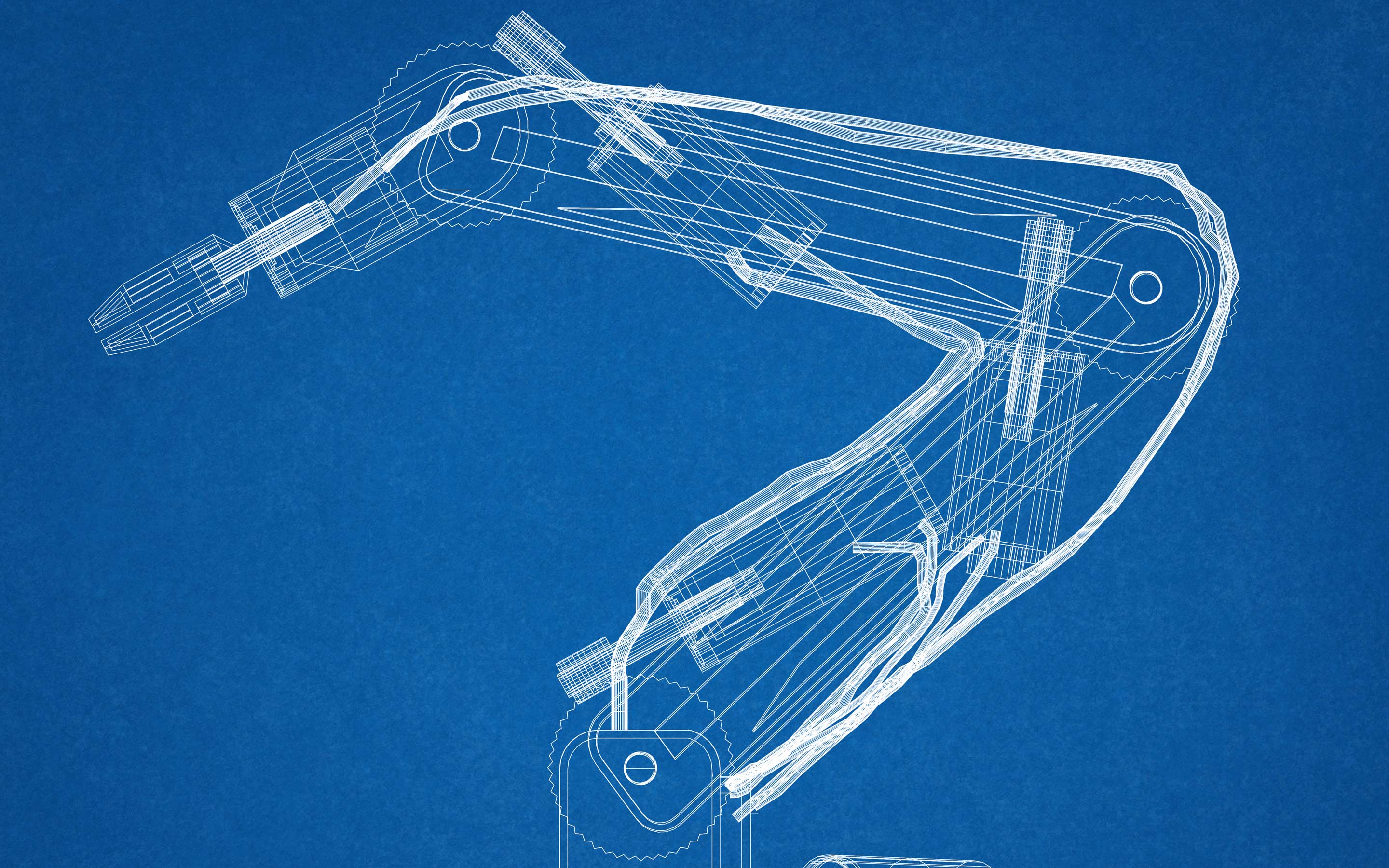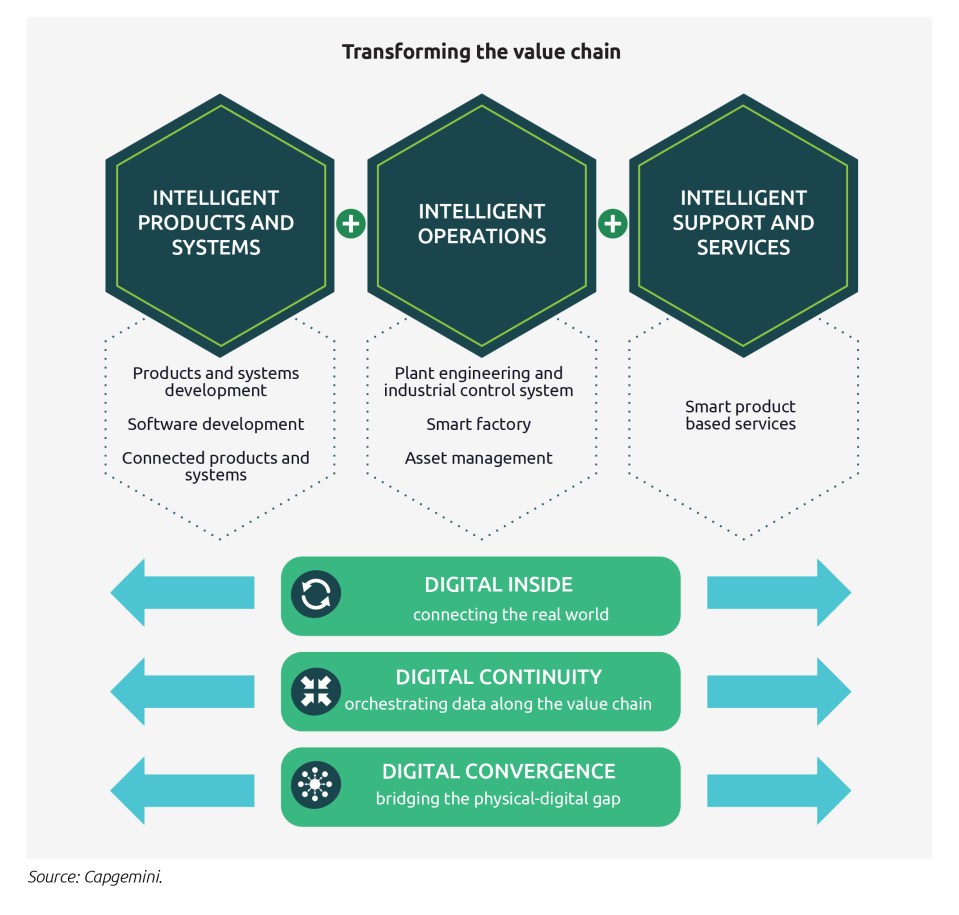
Capgemini perspective: intelligent industry
The next big transformation
by Roshan Gya, Managing Director, Intelligent Industry, Capgemini and William Rozé, CEO, Capgemini Engineering
While digital transformation is not a new concept, companies across industries are facing a variety of factors – growth in ecommerce, shortage in chips, mass personalization, growing concerns around sustainability, and climate change – that compel them to accelerate this transformation. Digital technology is no longer simply a lever with which to optimize a process for efficiency gains but also a means by which a product can be connected to the interactive environment around it. The growing convergence of products, software, and services holds the key to the next big transformation opportunity for organizations across industries.
The COVID-19 pandemic has further exposed vulnerabilities within organizations, putting pressure not only on production and distribution of products and services but also on design and engineering. Organizations are employing unique solutions to these challenging problems. Pharma companies such as GSK, Novartis, and Pfizer are using micro-factories, no bigger than a shipping container, to produce drugs and vaccines faster, more cheaply, and more efficiently.[1] The COVID-19 crisis has acted as a catalyst for ongoing transformation. Research has shown that 68% of organizations will accelerate their transformation investments in the next 12 months, with technology-led initiatives at the core.[2]
In addition to the market trends, a technology avalanche is forcing a sea change in business and operating models and is set to transform industries across all facets of customer interaction, business operations, manufacturing, and supply chains.
- Product digitalization: The evolving role of software in the automotive industry, for instance, is set to rebalance the competitive landscape in the coming years. We have already seen the contours of the industry change owing to the growing need to adopt, adapt, and master new software to design and produce the next generation of vehicles. Today’s vehicles are packed with more software features than ever. More functionality in the cars that can be controlled by software means that new features can be introduced through over-the-air updates, without the customer having to visit a workshop. This also means that the OEMs need to rethink their customer journey.
Connected products also allow organizations to mine and monetize the wealth of information they collect. Otis, an elevator manufacturer, moves around 2 billion people on any given day and holds troves of data on how people get around. The company plans to monetize this by sharing the insights it collects. Chris Smith, vice president of product strategy, says, “We can share this data and help others make peoples’ experiences more seamless and efficient. Now, maybe we could tell coffee shops around a building about what they can expect on a good day, that people will be going there around 11am based on our historical data, so they might want to staff up [at that time].”[3]
- Process digitalization: The combination of technology, cloud, and data is accelerating the digitization of core industrial processes, at scale.
- Take, for instance, 5G and edge technologies. Worcester Bosch, UK-based industrial manufacturer, realized a nearly 2% efficiency gain from their 5G trial.[4] 5G enables organizations to realize a variety of use cases that were hitherto deemed unfeasible, including video-based quality inspection, remote operations, AGVs and other autonomous robots, and remote collaboration using AR/VR-based applications.
- In the Life Sciences sector, data-driven transformation will enable R&D teams in biopharmaceutical companies to take a novel approach to drug discovery; better understand pathologies and patient care diseases and patients; identify therapies with higher potential; digitally optimize clinical trials; and accelerate time to market for new medicines and medical products.
- Digitalization of both product and process: Digital twins are enabling organizations to connect virtual systems with the physical world via real-time models that can be constantly simulated and optimized. Public authorities around the world, in Singapore, Shanghai, Stockholm, and Brooklyn in New York for instance, are turning to digital twins to help them in optimizing urban planning, infrastructure management, traffic monitoring or even disaster management.
Products, processes, services, operating models, and even business models are all undergoing a transformation. At Capgemini, we call this new era of transformation “Intelligent Industry”: Intelligent Industry is the next generation of digital transformation. It is about fostering synergies between the digital and engineering spheres to help companies build intelligent products, operations, and services, at scale.
Intelligent industry: A paradigm shift
From the pipette to the airplane engine, anything can become “intelligent.” Using state-of-the-art sensors that facilitate augmented control and data acquisition, robots on a production line will be able to communicate with each other and adapt the production process in real time, depending on maintenance requirements, market developments, or customer demand.
Intelligent Industry encompasses everything from intelligent products and systems to processes and services:

- Intelligent products and systems
Industrial systems and products are now connected and are powered by data. These smart and connected products mean increased uptime, improved efficiency, and also reduced costs. They also enable companies to move towards a “servitization” model. Intelligent products and systems also address the process digitalization to deliver these products in a more efficient manner.
- Intelligent operations
Intelligent operations encompass supply chain and manufacturing activities. It is about creating new “digital native” capacities or optimizing existing operations thanks to digital. Intelligent operations can also augment the sustainability goals of the organization by reducing emissions and conserving resources.
- Intelligent support and services
With connected products and platforms, after-sales services will be reinvented to focus on delivering a richer customer experience and proposing a set of new data-driven services, driving new revenue streams for organizations.
Data is the lifeblood, enabling the reunion of all these components. Organizations that are proven data leaders realize a significant performance advantage; for instance, they see 22% higher profitability than the average. [5] This is prompting organizations to undertake large-scale data-management programs. Volkswagen, for example, embarked on a multi-year industrial cloud project with the aim of combining the data of all machines, plants, and systems from all 122 of its group facilities. The objective of this massive transformation exercise is to optimize production processes and generate productivity improvements.[6]
To continue to grow in this new business environment, organizations must rebuild their product portfolios with the latest software and technologies embedded to make them smarter – but also more sustainable. Moreover, they must rethink the entire manufacturing and supply chains and adapt them to the growing demand for personalization and seamless delivery. The ability to capitalize on data assets will be key, both for optimization purposes and for creating new value-added services.
For a successful transformation to the Intelligent Industry, organizations will also need to bridge the talent shortage. Many are facing a demand-supply gap for skills related to AI, machine learning, and software engineering. A few are turning to upskilling to address this issue. Realizing the mismatch between the AI projects it was working on and the number of data scientists required to deliver them, Shell has made online training courses available to all interested employees.[7] Apart from its more than 200 data scientists, Shell has also trained 800 of its employees in basic programming skills to work on its AI projects.[8]
While climate-change concerns and regulatory pressures are forcing organizations to change, the rise of digital technologies is bringing the physical and digital worlds together, creating an ocean of opportunity. Intelligent Industry is helping organizations improve their operations and unleash innovation, thereby crafting a profitable and sustainable path forward. The future of Industry is Intelligent – and it is here now.
[1] Fast Company, “Corporate America must learn to innovate frugally to get through the coronavirus crisis,” March 27, 2020.
[2] Capgemini Research Institute, “Fast-forward to the future defining and winning the post-COVID new normal,” July 2020.
[3] IoT Agenda, “3 companies successfully monetizing IoT data,” May 2019.
[4] Ericsson. (n.d.) Worcester Bosch launches the UK’s first 5G factory. Retrieved from https://www.ericsson.com/en/cases/2020/the-5g-factory-of-the-future. Business & Innovation Magazine, “Worcestershire 5G testbed report shows productivity gain with 5G applications,” December 2020.
[5] Capgemini Research Institute, “The data-powered enterprise: Why organizations must strengthen their data mastery,” November 2020.
[6] Volkswagen AG. (2019, March). Volkswagen and Amazon Web Services to develop Industrial Cloud. Volkswagenag.com.
[7] CNBC, “Royal Dutch Shell reskills workers in artificial intelligence as part of huge energy transition,” April 2020.
[8] Udacity, “Announcing our newest collaboration with Shell,” February 2020.




































